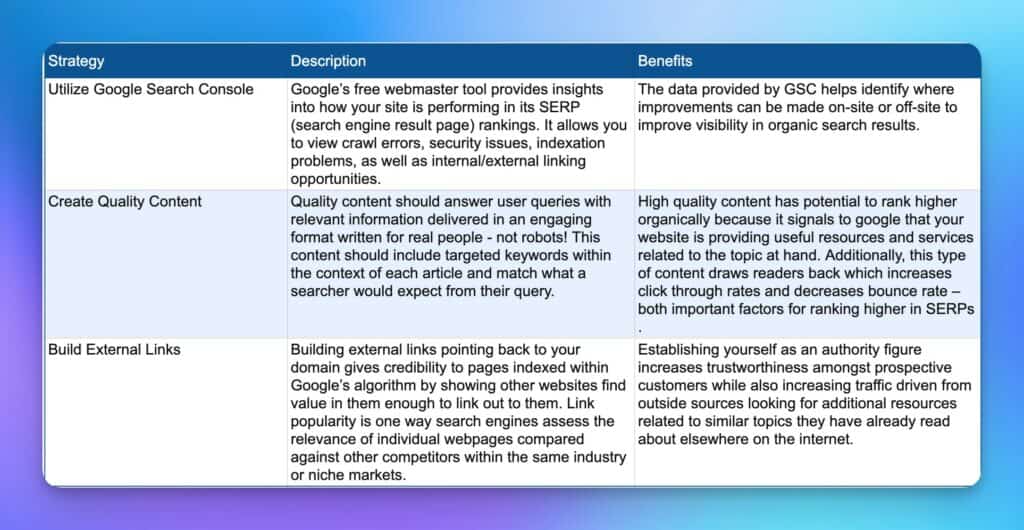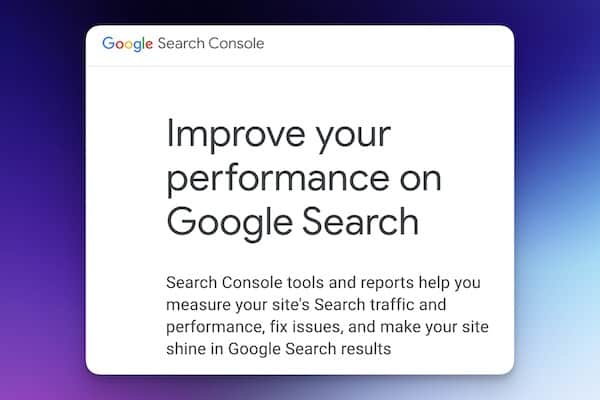Search Engine Optimisation (SEO) is a powerful way to increase online visibility. By understanding the fundamentals of SEO, companies can craft effective strategies that will help them reach their desired audience and improve their brand’s reputation. This article provides an overview of what SEO is and how it can benefit businesses in today’s digital age.
The importance of SEO has grown significantly over the past few years as more people are turning to search engines for answers or services they require. Understanding SEO principles and practices enables companies to capitalise on this trend and ensure their website appears prominently amongst competitors when potential customers search specific keywords related to their business.
Furthermore, by staying up-to-date with SEO trends, businesses can continue growing while adapting quickly to changes within the industry. Therefore, organisations must recognise the value of optimising their websites to remain competitive in today’s ever-evolving digital landscape.

What Is SEO?
Search Engine Optimization (SEO) is the process of optimizing a website for organic search traffic (un-paid traffic) from search engines like Google and Bing. SEO involves several components, such as keyword research, content creation and optimization, link building, and more. As people increasingly rely on technology to find information online, organizations must optimize their websites to rank higher in search engine results pages (SERPs).
By investing time into SEO efforts, businesses can increase their visibility in SERP rankings and gain more organic search traffic, leading to increased sales or other desired outcomes. SEO also helps ensure your target audience finds you when searching for relevant terms related to your products or services.
Ultimately, SEO helps create an engaging experience for visitors looking for what you have to offer — all while helping build trust with potential customers. With these strategies in place, companies can start reaching new audiences and driving positive outcomes through their organic search presence.
How Does Search Engine Optimization Work?
As mentioned, search engine optimization (SEO) is the process of optimizing a website to rank higher in search engine results pages. It involves understanding how search engine algorithms work and what people search for when using certain keywords or phrases. Implementing SEO techniques effectively requires understanding the relevant keywords that will optimize your page visibility on search engine rankings.
By researching these relevant keywords, you can create content around them that appeals to both search engines and users alike. This helps ensure that your website appears at the top of the SERPs when someone searches for related terms, which increases traffic and leads to more conversions. Additionally, regularly updating your existing content with fresh keyword-rich content boosts your website’s ranking over time.
Keyword Research For SEO
Conducting keyword research allows you to create content that will rank higher on search engines, thereby increasing organic traffic and leads. To properly conduct keyword research for SEO, one must first understand what keywords are most relevant to their industry and target market.
A keyword tool can identify popular terms related to a certain topic or product. The trick is finding the keywords that best describe your offering without going too generic or competitive with other businesses in the same space. When selecting keywords, it’s also important to consider local SEO tactics; there may be variations depending on where your potential customers are located geographically.
Breaking down keyword research into manageable chunks makes it easier to find success when optimizing for search engines:
- Start by researching topics related to your expertise (i.e., “content creation”).
- Narrow this list further using tools such as Google Keyword Planner and Moz Keyword Explorer, allowing users to filter out irrelevant queries based on monthly volume, competition level, etc.
- Once you have a more targeted list of relevant words and phrases, prioritize them according to relevance and importance so that you know which ones should receive more attention than others.
By conducting extensive keyword research before launching any SEO campaign, marketers can craft tailored strategies to capture their desired audience’s attention while staying ahead of their competitors—allowing them greater visibility and better conversions overall.
Understanding Search Engine Algorithms
Search engine algorithms are the key to understanding how search engines work and what drives their results. They are complex pieces of code that determine which web pages should appear in response to a query. Web crawlers use these algorithms to identify, index and rank content when it comes up in search engine queries. It is important for businesses looking to optimize their website’s visibility on search engine land to understand what they are dealing with regarding algorithmic complexity.
Technical optimization ensures your website meets various search engine requirements while providing an excellent user experience. This can include optimizing page titles, meta tags, image alt-texts, internal links, keyword density, etc. The goal is to ensure that all webpage elements support SEO effectiveness. Understanding how different parts of a website influence ranking signals is essential to succeed in your SEO strategy crafting endeavours.
Crafting An SEO Strategy
Crafting an SEO strategy involves more than simply understanding search engine algorithms. It requires implementing strategies considered best practices that will help increase organic search results. An effective approach to developing a successful SEO strategy includes utilizing Google Search Console, creating high-quality content tailored for users’ search intent, building external links, and optimizing website performance.

While implementing all these steps may seem daunting at first glance, following sound SEO principles offers lasting rewards when done correctly over time, such as increased visibility resulting in more qualified leads visiting your website who are more likely to take action once there due to targeting specific audiences based upon their digital footprint across multiple channels online.. All these efforts culminate in having a greater online presence among those searching for solutions you provide, thus improving overall ROI (return on investment). With careful optimization and monitoring utilizing tools such as Google Search Console and well-thought-out SEO strategies, businesses can reap many benefits from improved rankings for desired keywords and phrases, assisting them in reaching long-term goals by leveraging valuable customer feedback collected during this process.
Utilizing Google Search Console
Google Search Console is an invaluable tool for any business wanting to understand how search engines perceive their website. It offers a wealth of data on the performance of your site and its contents, which can be used to inform decisions about SEO improvements. The console also provides insights into user behaviour and engagement metrics, enabling you to track trends over time.

Using Google Search Console can help businesses take full advantage of what they have available within the platform:-
Optimizing visibility
Monitor keyword rankings and analyze organic traffic sources related to content optimization. Find opportunities to improve CTRs or tweak meta descriptions to increase visibility through organic searches.
Diagnosing technical issues
Identify indexing problems caused by broken links, crawl errors, duplicate pages, etc., and check robots.txt files for potential roadblocks regarding crawling activity from search engine bots.
Reviewing content effectiveness
Analyze queries and page impressions related to specific keywords or topics; monitor clicks vs impressions ratio (CTR) for each query; review usage statistics for individual pieces of content such as blog posts or product reviews; study bounce rate stats associated with particular sections of the website.
By taking a closer look at how users interact with our sites, we gain valuable insight into where there may be room for improvement when it comes to optimizing web presence across various channels like Google Ads and other search engines—allowing us to make more informed decisions about both our CMS and overall marketing strategy.
Generating Organic Search Traffic
Organic search traffic is the lifeblood of most websites and businesses. To generate organic traffic, you must optimise your website for search engines. Search engine optimization (SEO) is a set of strategies designed to help sites rank higher in organic search results on major search engines like Google, Yahoo!, and Bing. SEO involves creating content that contains keywords related to what people are searching for and improving the technical aspects of your site so it can be indexed by search engines more easily.
You can also use other tactics to increase your rankings, such as link-building and social media marketing. Link building is when you get links from other websites pointing back to yours, which helps build credibility with the search engines. Social media marketing involves creating content that drives organic shares, likes, comments, clicks, etc., contributing to better ranking potential. The key to successful SEO is understanding how each element works together to create an effective strategy to drive long-term organic growth and improve overall visibility in the SERPs (search engine result pages). With this knowledge, you can develop a comprehensive plan that caters to your goals while delivering sustainable success over time.
The Benefits Of Search Engine Marketing
SEO efforts focus on creating relevant content, improving page speed, building backlinks, and implementing technical optimizations such as meta tags or structured data. It can be a long-term investment that yields valuable returns when done right.
But let’s not forget the short-term benefits of Search Engine Marketing (SEM). Paid search provides immediate visibility and traffic to your website through ads featured prominently in SERPs. This offers an unbeatable opportunity to capture leads while you work on your behind-the-scenes SEO efforts.
Additionally, off-page SEO tactics like link building contribute to higher organic ranking over time — another major benefit of SEM. Both paid search and online marketing strategies are powerful tools for driving qualified visitors to your site at any stage of the customer journey, from awareness to purchase intent.

Maximizing Organic Search Results
Two of the discipline SEO professionals focuses on is usually optimizing both on-page and off-page elements to boost organic rankings.

Creating content that meets users’ search queries and correctly uses meta tags can improve your ranking with Search Engines. Additionally, link-building through reputable websites and social media marketing will help increase trustworthiness and authority in the eyes of search engines. Lastly, online reputation management keeps your brand visible while improving its credibility among potential customers.
Successful SEO requires balancing all these aspects into a cohesive strategy that builds up long-term gains over time without sacrificing quality or integrity. The ultimate goal is to drive more business from organic traffic sources, which only comes from an effective engagement plan built around creating valuable content backed by robust optimization techniques. Without such a plan, organic search engine rankings success may not be achieved as quickly as desired.
Improving Rankings In Search Results
Search Engine Optimisation (SEO) stands for optimising websites and web pages to appear higher in search engine results. This process involves making sure that the content on a website is relevant and helpful so it can be ranked higher than other sites when users type particular keywords into search engines. Here are five ways to improve rankings in search results:
Create Quality Content
Creating a quality, keyword-rich content will help your site rank better because search engines discover relevant information useful to visitors.
Use Relevant Keywords
Incorporating specific keywords throughout your website helps search engines understand what topics you cover and how they relate to other websites competing with yours.
Monitor Your Site’s Performance
Tracking how well your site ranks against competitors allows you to adjust tactics accordingly to ensure you remain competitively placed within search engine results.
Utilise Search Tools
Using tools such as Google AdWords or Bing Ads gives you an insight into which terms people use most often when searching for products or services related to yours.
Improve Page Load Speed
A slow page load speed can hurt user experience, which makes it difficult for search engines to provide an accurate and relevant ranking of your site compared to others.
By improving rankings in organic searches, businesses can increase visibility, attract more customers, and gain valuable insights from tracking performance data. Furthermore, understanding the importance of relevant keywords and using them strategically enables companies to reach their target audience quickly and easily through effective SEO practices.
Relevant Keywords And Their Importance
Relevant keywords are a critical component of any SEO strategy. Search engines like Google, Yahoo and Bing use these words to index web pages for search results. Using relevant keywords in content increases the chances that your website will appear among the top search engine results pages (SERPs).
Internal links are also important for optimizing websites for major search engines. Linking pages within site can improve its ranking on SERPs, known as internal linking optimization. Additionally, social media marketing has become essential for businesses that want to increase their online visibility. Utilizing tools like Twitter and Facebook can help build brand recognition and drive traffic to your website.
When creating an effective SEO strategy, it’s important to research and understands what works best with major search engines. Using keyword analysis tools can help determine which terms are often used in searches related to your business or industry niche.
Once you have identified the right mix of relevant keywords, they should be strategically placed throughout the page text – including titles, subheadings and body copy – so that readers gain instant insight into what the page is about when they arrive at it from a search engine query. This will ensure higher click-through rates from SERPS and more conversions over time.
Analysing Search Engine Results Pages
Search engine results pages (SERPs) are the listings of webpages that appear after a user enters a search query into a search engine such as Google. To understand how to optimize for SERPs, it is important to analyse them. This includes looking at page titles, meta descriptions, and on-page SEO factors like content quality and keyword placement.
Off-page optimization also plays an important role in improving website rankings on SERPs. Link-building techniques can acquire backlinks from other websites, while social media marketing can help promote content more effectively across various channels. It is essential to track how these efforts affect SERP rankings over time to identify the most successful strategies. By understanding what works best for achieving higher visibility in search engines, businesses can ensure their websites stand out among competitors and attract more potential customers online.

Techniques To Improve Search Rankings
SEO helps site owners increase their online presence and attract potential customers to their websites. Improving SEO rankings involves technical and off-page optimisations and content marketing strategies to ensure that the website provides visitors with the best user experience possible.
The following table provides an overview of techniques used to improve SEO rankings:

By optimizing these areas, website owners can effectively boost their SEO rankings by ensuring their website meets all requirements set out by search engines and providing relevant content users actively seek out. It also allows them to track better analytics such as page views, bounce rates and conversions to gain insight into how successful their efforts have been so far. This data can then be used to refine and optimize techniques for even better results.
Content Marketing And Its Role In SEO
Content marketing is the foundation for all SEO efforts, like a carpenter building a house. Search engine optimization (SEO) helps optimize web pages to be found and ranked higher in search engines when people enter relevant queries. Content marketing improves website visibility by creating high-quality content that other websites will likely link back to. This off-page optimization increases website traffic and generates more leads or sales.
The key elements of successful SEO include optimizing web pages with keyword-rich titles, meta descriptions, header tags, alt text on images, anchor text links and internal linking structure. Quality content should provide valuable information related to the product or services offered while targeting specific keywords to gain better rankings in search results. Additionally, businesses must create an effective strategy involving social media engagement and channelling their target audience through different platforms such as blogs and video sites like YouTube.
Content marketing has become integral to any comprehensive SEO plan because it helps build relationships with potential customers and drives organic traffic from other websites directly to yours. Creating compelling articles, blog posts, infographics, videos, and podcasts can increase your site’s online visibility. It’s important to produce quality content and use strategies such as outreach campaigns involving influencers within your niche market who can help spread the word about your products or services to new audiences.
With these tools combined together, businesses can maximize their reach across multiple channels, thereby increasing their chances of success with web pages, search queries and SEO efforts.
Web Pages, Search Queries And SEO Efforts
Search engine optimisation (SEO) involves making changes to web pages and their content and using SEO tools such as pay-per-click campaigns, link building and other strategies to improve a website’s ranking on the first page of a search result page.
Landing pages are also important for SEO efforts. They must be designed with an effective user experience that encourages visitors to act while providing relevant information about the promoted product or service. Landing pages should contain keywords related to the targeted keyword phrase so they can rank higher in the search engines, thus increasing organic traffic. Additionally, landing pages should include calls-to-action (CTAs), forms and links that make it easy for users to connect with your business quickly. By utilizing these techniques, you can ensure that your website has more visibility in the SERPs and ultimately drive more sales from organic searches.
Frequently Asked Questions
What Is The Cost Of SEO Services?
To understand the cost of SEO services, it’s important to consider the variety of approaches professionals can take. Depending on the size and complexity of your business and its goals, an SEO professional may recommend any number of tactics:
- Implementing content marketing strategies
- Developing link-building campaigns
- Creating pay-per-click advertising programs
- Analyzing website structure & performance
- Utilising tools such as Google Analytics & Webmaster Tools
The best way to determine how much you should spend on SEO services depends on several factors related to your circumstances. For example, some companies may require more extensive technical work than others, while some might need more help creating quality content. Additionally, those with larger budgets may have access to more advanced technologies or higher levels of expertise, which could result in greater returns down the line. Investing in good SEO practices can lead to short-term benefits, like increased traffic, and long-term rewards, such as better brand recognition and improved customer relationships.
When considering an investment in SEO, business owners must weigh the potential return against their available budget and resources – understanding that this approach has become increasingly valuable over time due to changes in consumer behaviour and technological advances. As such, having a well-thought-out strategy tailored to your organisation’s needs is essential for getting maximum value from your investment in search engine optimisation services.
How Long Will It Take To See SEO Results?
The answer depends on several factors, such as the content on your website, the keywords you are targeting, and even the competition for those terms. Seeing your content ranked could take a few days, weeks, months or not at all.
The time it takes to succeed with SEO also depends on whether or not you have an existing site structure and content. If your site already has good-quality pages and links from other sites, you may get some quick wins from optimizing titles and descriptions. However, if your website is new or hasn’t been optimized for SEO, it could take longer to reach desired results. Additionally, if there is high competition for certain keywords, achieving success with SEO might require more effort and resources than other less competitive terms.
For most organizations looking to maximize their online presence through SEO efforts, investing in professional services can help accelerate progress. A qualified SEO expert can analyze current rankings and develop strategies to improve visibility in organic search results. With clear objectives set up front and ongoing analysis of metrics along the way, businesses can work together with service providers to ensure successful outcomes are achieved quickly while remaining within budget constraints.
How Do I Know If My Website Is SEO Friendly?
Understanding how your website is performing concerning its SEO effectiveness can be difficult. In order to ensure that your website meets the standards of Search Engine Optimisation (SEO), you should consider a few key factors. Knowing if your website is ‘SEO friendly’ or not means understanding these components and making sure they are all up-to-date.
One way to determine whether your website meets current SEO standards is through online tools such as Moz’s free crawler, which will check for any technical issues, measure keyword density, check title tags, meta descriptions, and more. Having a comprehensive analysis performed on your site can help identify potential areas of improvement so that you know exactly what changes need to be made to improve search engine visibility and rankings. Additionally, keeping track of analytics data such as impressions, clicks, and conversions over time can give insight into how well users respond to certain content and page design elements on your site – providing the opportunity for further optimization efforts.
It’s important to remember that SEO isn’t something you do once; it requires continual effort and monitoring. Keeping tabs on industry trends, best practices, and algorithm updates from Google (and other major search engines) is essential for staying ahead of the competition regarding organic traffic growth. With some knowledge about SEO fundamentals and consistent monitoring of performance metrics related to search engine visibility, you can get a good idea of how effective your SEO efforts are — helping drive long-term success for both yourself and your business partners.
Is SEO Worth The Effort?
Search engine optimization (SEO) is a hot topic among businesses seeking to boost their online visibility and attract potential customers. But amidst the buzz, many business owners wonder if SEO is worth it. After all, there’s no guarantee of success in such an unpredictable field. While some hesitate to invest time and energy into something that may not bring results, others see great opportunity in properly leveraging SEO technology.
Like any other form of marketing or advertising, SEO requires dedication and attention to detail. Those who know how to implement effective strategies can reap tremendous rewards from investing in search engine optimization. The benefits are plentiful, from increased website traffic to higher conversion rates – but only when done right! An experienced team of professionals should be consulted beforehand to ensure your website meets current best practices for optimal performance on search engines like Google and Bing. Furthermore, ongoing maintenance will help keep your website up-to-date with ever-changing algorithms, so you remain competitive in this dynamic environment.
The key takeaway here is that while SEO isn’t always a surefire way to succeed online, it can certainly pay off if implemented correctly by experts with experience in the industry. Companies can enjoy long-term advantages over their competitors without spending money on ads or promotional services continually when done well. As far as investments go, SEO proves itself again and again as one of the most viable paths forward for any digital enterprise looking for sustained growth.
What Tools Are Available To Measure SEO Performance?
Whether one should invest in SEO or not has been asked many times, but another important issue to consider is what tools are available to measure an organisation’s performance with regard to its SEO efforts.
Fortunately, plenty of options allow businesses to track the effectiveness of their campaigns – some free and others paid. For starters, Google Analytics offers detailed insights into website metrics such as page views, bounce rates and visitors’ sources. This data can identify areas where improvements may be needed for organisations to target customers through optimising content strategies or redesigning websites. On top of that, Google Search Console provides valuable data about keywords rankings on search engine result pages (SERPs). Additionally, other third-party tools like Moz Pro offer comprehensive packages for tracking progress over time using features such as keyword research analysis and backlink monitoring.
Businesses should take advantage of these helpful resources when planning their SEO initiatives to keep up with the competition and ensure they’re getting the most out of their investment. By closely following key performance indicators (KPIs), companies can get a clear picture of how well their strategies work, so they know which tactics need refining or tweaking to improve ROI.
Conclusion
Conclusion: Search engine optimisation, better known as SEO, is a process that helps websites and their respective content to be accessible by search engines. It can be expensive if not done correctly, but the investment in time and resources is often well worth it. SEO has become increasingly important for businesses looking to establish an online presence or increase visibility in organic search results.
Understanding its key principles and using available tools is essential for success. To quote an old adage, “A stitch in time saves nine”; investing the effort necessary to ensure your website is up-to-date with best practices from the outset will pay dividends further down the line. With this knowledge, you can confidently embark on your next SEO endeavour, knowing that it will yield positive outcomes for your business.
Should you need help accelerating your SEO efforts, we at xSquare are here to help. Do check out our SEO service page and contact us for consultation.